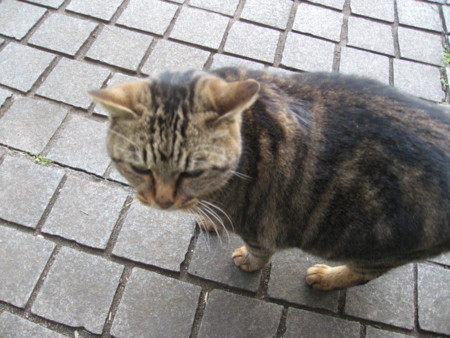スノーボードの国母選手が服装の乱れでバッシング
されましたが、スノーボードの選手は皆あんな感じ
らしいです。
アメリカ選手はハンケツのジーンズ(のようなもの)
ですべってました。
これはもはや、異文化、といえます。
国母選手を理解できない人は異文化理解ができない人かも。。
温かい目で見守りましょう。

■NHKラジオ 実践ビジネス英語 How to Be Nice in Bad Times (1) 2/17 2010
■意味を考えてみよう。今日取り上げる単語が含まれています。
Dear me, Melinda, what have you been up to?
Come, come.
I'm sure you're being too hard on yourself.
No sense in keeping it bottled up inside.
I just can't believe how insesitive I was to poor Bette.
──────────────────────────────
dear me, おやおや。あらまあ。(驚きや困惑などを表す)
──────────────────────────────
You can use dear in expressions such as 'oh dear', 'dear me',
and 'dear dear' when you are sad, disappointed, or
surprised about something.
ex) Outside, Bruce glanced at his watch: 'Dear me, nearly
one o'clock.'
──────────────────────────────
Come, come, まあまあ。おいおい。(相手の言動をやんわり非難
したり相手を励ましたりする表現)
──────────────────────────────
People say 'Come, come' to indicate that they disapprove of
or disagree with what someone has just said or done.
[OLD-FASHIONED]
ex) 'You hope for something in Mrs Zuckerman's will?'
'Come, come, Mr Trethowan. Of course not.'
──────────────────────────────
be hard on, ...に厳しい、...につらく当たる
──────────────────────────────
If you hard on someone, you treat them severely or unkindly.
ex) Don't be so hard on him.
──────────────────────────────
keep something bottled up inside, (感情など)を自分の中に
抑えておく、...を自分の中に閉じ込めておく
──────────────────────────────
If you bottle up a strong feeling, you deliberately do not
express it for a long time, although you find this very
difficult.
ex) All the rage that had been bottled up in him for so
long flooded out in a torrent of abuse.
──────────────────────────────
insensitive, 無神経な、思いやりのない
──────────────────────────────
If you describe someone as insensitive, you are criticizing
them for being unaware of or unsympathetic to other people's
feelings.
ex) I feel my husband is very insensitive about my problem.
──────────────────────────────
その他にも、次も押さえておきたい。[誌面の都合上省略] ★は重要表現
──────────────────────────────
heel, 悪者、ろくでなし
faux pas, 無作法、エチケット違反、軽率な行い
be in the same boat, 同じ境遇にある、運命を共にしている
be out of line, (人の言動などが)不適切である、受け入れ難い
crow about, ...を自慢げに言う、...を自慢する
be a bit down on one's luck, ちょっと運に見放されている
career-wise, 仕事の面で、仕事に関して
cut someone some slack, (人のこと)を少し大目に見る
